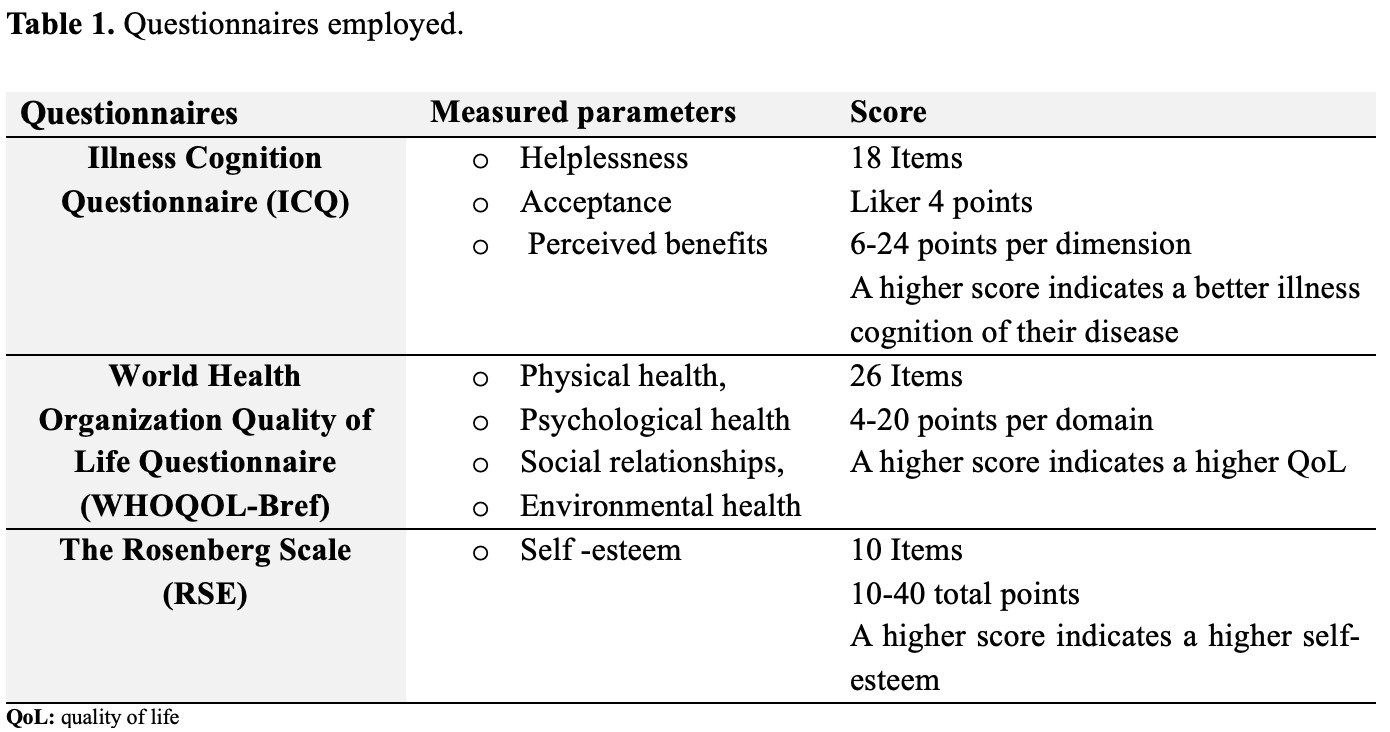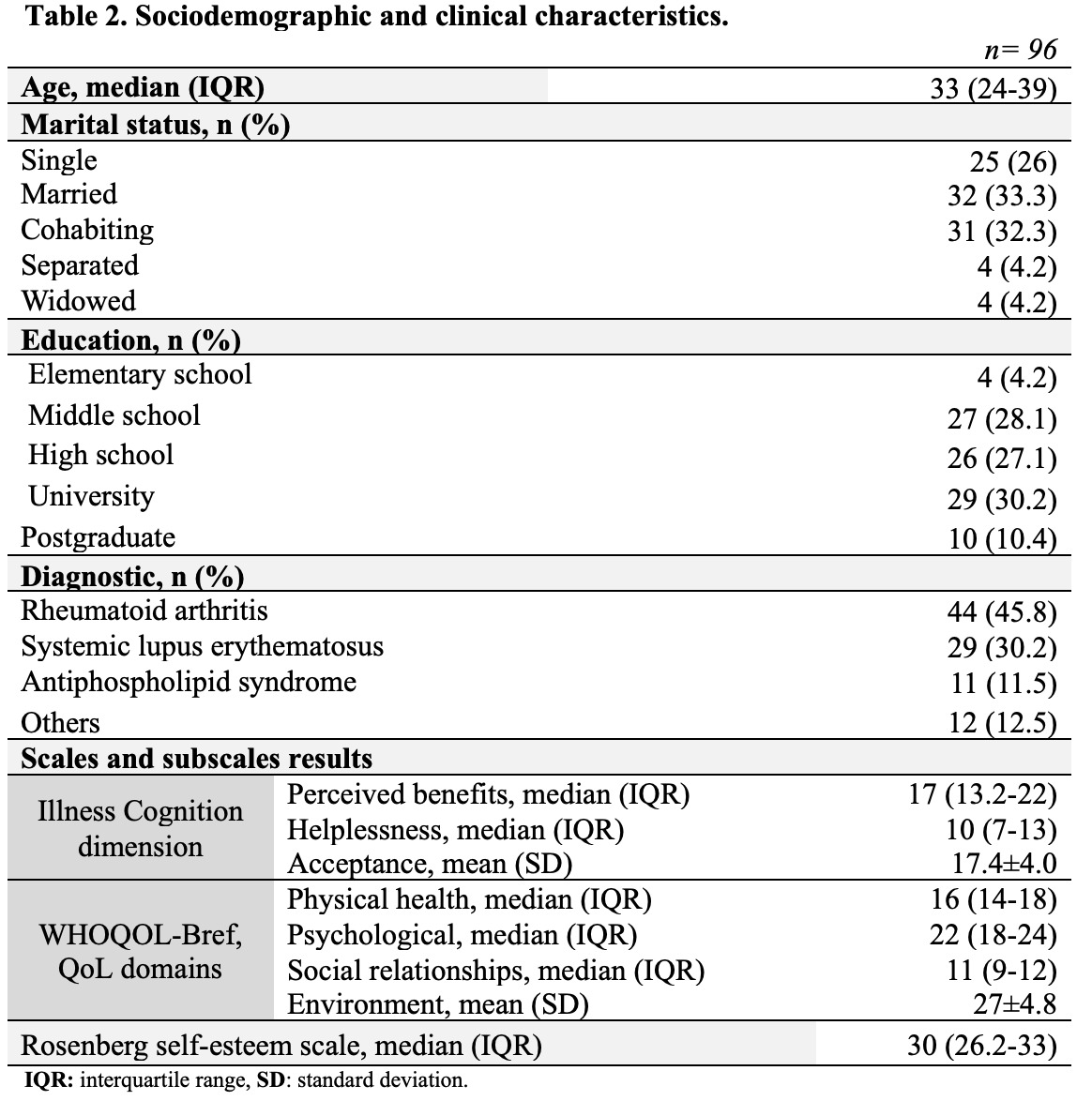Session Information
Session Type: Poster Session B
Session Time: 10:30AM-12:30PM
Background/Purpose: Autoimmune rheumatic diseases (ARDs) are inflammatory conditions associated with impaired joint mobility, recurrent pain, and fatigue leading to poor emotional health and negative feelings impacting the quality of life (QoL). Coping with chronic diseases involves psychological factors such as the patient’s illness recognition and self-esteem. Illness cognition refers to the patient’s implicit common-sense beliefs about their illness. Finding benefits from the disease and improving self-esteem can significantly impact physical and mental well-being, thus improving QoL. We aimed to correlate illness cognition and self-esteem with QoL in reproductive-age women with ARDs.
Methods: An observational, cross-sectional, and descriptive study was performed in reproductive-age women with ARDs (18 – 50 years) treated at a University Hospital. They were asked to answer three questionnaires (Table 1). The Illness Cognition Questionnaire (ICQ) is an 18-item survey that measures patients’ helplessness, acceptance, and perceived benefits. The World Health Organization Quality of Life Questionnaire (WHOQOL-Bref) is a 26-item scale that assesses physical health, psychological health, social relationships, and environmental health. The Rosenberg Scale (RSE) is a 10-item scale that measures self-esteem. Kolmogorov-Smirnov, Spearman, and Pearson tests were performed. Data are presented in frequencies, percentages, mean and standard deviation (SD), or median and interquartile range (IQR).
Results: A total of 96 reproductive-age women with ARDs were included with a median age of 33 (IQR: 24-39). Sociodemographic and clinical characteristics mean and median results of every scale and dimension are described in Table 2.
We found a significant correlation between the patients’ disease acceptance and the four QoL domains: physical health (p= 0.000, r=0.373), psychological (p=0.000, r=0.532), social relationships (p=0.000, r=0.445), and environment (p=0.000, r=0.548). Helplessness significantly correlated with the four QoL domains physical health (p= 0.000, r=-0.494), psychological (p=0.000, r=-0.641), social relationships (p=0.000, r=-0.487), and environment (p=0.000, r=-0.401) was found. Perceived benefits were significantly correlated with QoL domains; score correlations are found in Table 3. Self-esteem was significantly correlated with QoL physical health (p= 0.000, r=0.440) and psychological domains (p=0.000, r=0.370). We noted a significant correlation between self-esteem, perceived benefits (p=0.008, r=0.270) and disease acceptance (p=0.015, r=0.248).
Conclusion: Reproductive-age women with ARDs who found higher acceptance and perceived benefits of their disease had higher QoL in all its domains and better self-esteem, while those with higher helplessness had worse QoL. Encouraging interventions focused on changing negative perceptions of self-esteem and the disease may positively impact their overall QoL domains and self-esteem.
To cite this abstract in AMA style:
Rodriguez-Flores A, Rodriguez G, Ponce M, Carrazco Chapa A, Chavez-Olivo K, Romero-Avila A, De Hoyos-Perez V, Cardenas-de la Garza J, Perez-Barbosa L, SKINNER TAYLOR C, Galarza-Delgado D. Impact of Illness Cognition and Self-Esteem on Quality of Life in Reproductive-Age Women with Autoimmune Rheumatic Diseases [abstract]. Arthritis Rheumatol. 2024; 76 (suppl 9). https://acrabstracts.org/abstract/impact-of-illness-cognition-and-self-esteem-on-quality-of-life-in-reproductive-age-women-with-autoimmune-rheumatic-diseases/. Accessed .« Back to ACR Convergence 2024
ACR Meeting Abstracts - https://acrabstracts.org/abstract/impact-of-illness-cognition-and-self-esteem-on-quality-of-life-in-reproductive-age-women-with-autoimmune-rheumatic-diseases/



